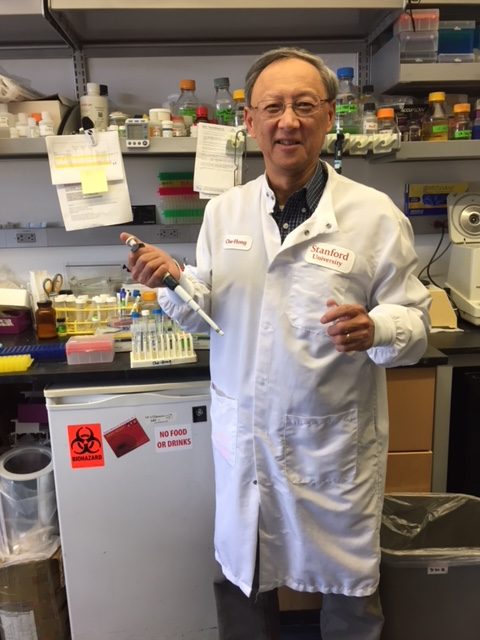Spotlight Che-hong Chen

When you’re at a get-together or at a year-end party, you might see a friend looking up after a few sips of their favorite drink with a bright red face; they’re glowing with the “Asian Flush”. The blushing face that affects over 560 million people worldwide might appear endearing, but Asian Flushing Syndrome is linked to high rates of esophageal and oral cancers, and possibly over 200 other serious health issues.
Alcohol is processed mainly by two enzymes: ADH, which breaks alcohol down into acetaldehyde – a class 1 carcinogen – and ALDH2, which breaks acetaldehyde down into acetic acid. But in the 36% of East Asians and almost half of Taiwanese people with ALDH2 deficiency, acetaldehyde builds up causing flushing, dizziness, tachycardia, and vomiting, – and sharply increases the risk of cancer. For this group, more than two drinks per day increases the risk of esophageal cancer a staggering 400 times.
The genetic basis for the flush reaction was discussed by Dr. Che-Hong Chen during his recent visit to TMU. A flusher himself, Dr. Chen began looking into the role of ALDH2 during his research on the cardio-protective effects of alcohol. For people with ALDH2 deficiency, these benefits did not apply, but attention to this issue was lacking in the US and Europe. After a visit in 2008, Taiwan was a clear option as a base for further research. “Taiwan has good medical data, uniform medical care, physicians are well trained, so data is reliable, [and] technology is advanced”
By 2015, Dr. Chen, with the help of former TMU president, Prof. Yun Yen, had set up the Stanford-Taiwan ALDH2 Deficiency Research (STAR) consortium to promote multidisciplinary research and education on ALDH2 deficiency related diseases. Making Taiwan a model for disease prevention is now Dr. Chen’s mission: “Every university should have someone doing this research… I want every doctor in Taiwan, every nurse in Taiwan, in five years from now to know about alcohol flushing and its health risks… We can study here and bring our findings to other parts of Asia.”
Currently, Dr. Chen is not only actively conducting basic research on ALDH2 deficiency and human diseases at Stanford University, he also tries to seize everyone possible opportunity to educate the Asian communities about the danger of alcohol flushing in both the United States and Taiwan. In the near future, he also plans to organize a volunteer group called “Taiwan Alcohol Intolerance Education Society” to focus on public health education to the students and citizens in Taiwan.
Alex Wu, associate professor at TMU’s Center for Translational Medicine and STAR consortium researcher, spoke about other avenues of ALDH2 research that are opening up at TMU, including his own work on ALDH2 deficiency influences on liver cancer. “In Asia a large cohort of people are susceptible to these cancer risks so there is definitely a need for more research. Neurodegenerative disease [like Alzheimer’s, Parkinson’s, and dementia] will be a focus for the next few years, so I think the addition of this ALDH2 deficiency component will be very meaningful and relevant to the Taiwanese population”.
Yet challenges in awareness about the Asian Flush remain. “Despite the high level of medical [services], still only few people know about ALDH2 deficiency” said Dr. Chen. It will require combined efforts from researchers, clinicians, educators public health officials and resources from the government to make this awareness campaign successful in Taiwan. If you turn red when you drink, enjoy in moderation. Limit yourself to one drink two times per week. “It’s our responsibility to tell people about this… once they have the knowledge, they are willing to change their drinking behavior. Spread the word.”
For interviews or a copy of the paper, contact Office of Global Engagement via global.initiatives@tmu.edu.tw.









